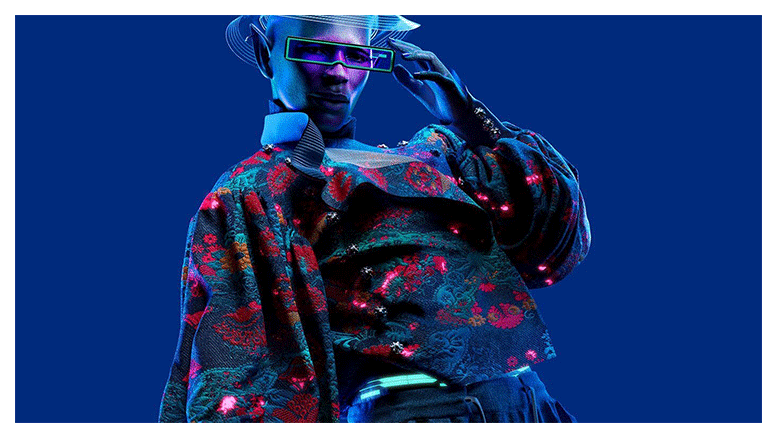Virtual fashion has rapidly become more than just a buzzword—it’s a transformative force reshaping how we experience clothing, creativity, and connection. From immersive runways to avatar-driven showrooms, the future of fashion is being rewritten—pixel by pixel.
Fashion Weeks to Virtual Events
Since the outbreak of COVID-19, virtual fashion has redefined the rhythm of the global fashion industry. What began as a digital detour during the global pandemic has evolved into a full-fledged movement, blending storytelling, sustainability, and tech innovation. As traditional Fashion Week events across New York, Paris, London, and Milan came to an abruptly standstill, the industry was forced to pivot overnight. The pandemic didn’t just delay runways—it catalysed an overdue transition into the digital realm.

Fashion in the Digital Age
The sudden shift may have appeared abrupt, but the transformation had been long brewing. During Milan Fashion Week 2020, shrinking audiences and closed-door presentations signalled the beginning of this paradigm shift. When lockdowns became the norm, fashion houses and event organisers had to act fast, turning to digital platforms as the only viable solution.
Virtual fashion events emerged not just as a necessity, but as a proving ground for innovation. Brands like Moschino stunned audiences with a surreal advergaming presentation of their Spring/Summer 2021 collection, using marionette dolls to model miniature versions of garments. Designer Jeremy Scott even featured puppet versions of Anna Wintour, Hamish Bowles, and himself, offering a meta-narrative on fashion’s need to reinvent by starting small.
Similarly, Dior’s mythical miniature couture show and Valentino’s gravity-defying acrobatic performance showcased how storytelling and technology could merge to elevate fashion in the digital age.
Closer to home, Indian designers like Gaurav Gupta and Manish Malhotra collaborated on fashion films, while Amit Aggarwal’s underwater couture film reimagined the runway for Indian Couture Week 2020.
This begs the question: Is Digital Technology in Fashion finally reshaping the fashion industry?


The Rise of Virtual Fashion Weeks
Virtual fashion is no longer a temporary fix—it’s a rising movement. Though digital fashion events predate COVID-19, the pandemic accelerated both their sophistication and mainstream acceptance. As audiences and brands became more digitally savvy, the level of creativity in presentation skyrocketed.
What was once an exclusive experience, limited to the fashion elite, became globally accessible. From your living room, you could attend shows in London, New York, Paris, Tokyo, Milan or Mumbai—all in a single day. This democratisation made fashion feel more grounded and inclusive.
Yet, questions remain: Can digital runways replace the electricity of live events? Will the digital tide persist post-pandemic?
Embracing the Digital Renaissance
Luxury Fashion responded to these challenges in vastly different ways. Chanel collaborated with renowned film directors to produce cinematic shows, proving that creative storytelling transcends physical boundaries.
Helsinki Fashion Week, known for its sustainable ethos, took a futuristic leap with Evelyn Mora’s Digital Village—a metaverse where 3D models showcase garments to audiences in avatar form, complete with virtual try-ons and crypto transactions.


Then, as London Fashion Week 2021 partnered with platforms like Joor to launch virtual showrooms, it became clear that fashion tech had arrived—not as an accessory, but as an integral part of the experience.
As Burberry proved, embracing digital transformation early can become a strategic advantage. Before the pandemic, Burberry was already innovating while traditional brands hesitated.
The situation presents an excellant opportunity for experimental and financially struggling brands as virtual platforms offer a lifeline. They reduce travel, venue, and production costs, allowing brands to focus more on creativity and connection.
Today, digital fashion intersects with digital personalities. Even Influencers on Global Fashion Trends have become dominant in luxury fashion and the mass market, shaping consumer behaviour.
The Hybrid Horizon
Hybrid Fashion Weeks are emerging as the middle ground between immersive physical experiences and the efficiency of virtual platforms. While in-person events will return, they’re likely to be augmented with digital layers that reflect new behaviours—social distancing, global viewership, and data-driven insights.
This evolution prompts a broader reconsideration: Is the traditional fashion calendar still relevant? Once defined by the trickle-down effect, where luxury brands set trends for mass markets, fashion now moves in all directions. The digital era has made fashion faster, more collaborative, and infinitely adaptable. Perhaps COVID-19 allowed Fashion Weeks worldwide to become more flexible.
Beyond the Runway: Virtual Fashion as Interface
As fashion collides with technology, we’re witnessing the birth of new interfaces—immersive experiences that go beyond mere spectacle. Designers, technologists, and digital artists are collaborating in ways once unimaginable, rethinking the very notion of a runway.
Virtual fashion isn’t just a pandemic-era solution. It’s a reinvention. An awakening. A movement that redefines legacy, democratizes access, and dares to ask: what if fashion wasn’t confined by geography, time, or touch?
As the dust settles, we may find that the pandemic didn’t pause fashion. It fast-forwarded it.

